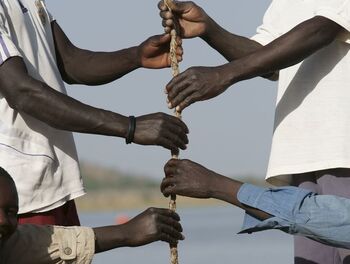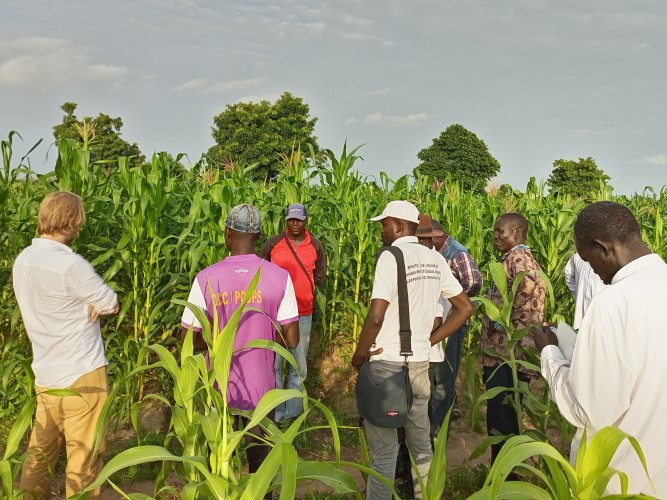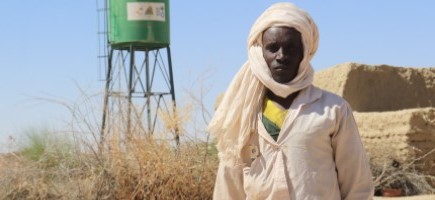
14.02.2025
Cross-border water management: the power for peace
In our interview, Mamman Nuhu, Executive Secretary of the Lake Chad Basin Commission, explains how joint water management can help stabilise the Sahel region.
Mr. Nuhu, as head of the Lake Chad Basin Commission you have been campaigning for cross-border water management for many years. What role does water play for peace, security and conflict prevention in the region?
In the Lake Chad Basin, water plays a dual role. On one hand, its scarcity, worsened by environmental changes and poor management, leads to conflicts, displacement, and terrorism. This harms livelihoods and creates competition. On the other hand, when managed well, water can promote peace, security, and development. The main challenges—climate change, conflict, and displacement—are interdependent, making them more complex to handle. One problem can trigger others, destabilizing the region further. When a lack of resources forces people to leave their homes, we need to develop timely plans to help them relocate. Issues such as land management, access to water, sanitation and electricity as well as conflict prevention need to be considered. Without good management, competition for resources can lead to violence.
What measures are you taking to ensure that water use does not lead to conflicts?
The Lake Chad Basin Commission (LCBC) promotes peace and security by managing water and environmental resources sustainably. It tackles climate change, conflict, and water scarcity with a multi-level approach. Regionally, the commission has established policies for climate-sensitive and conflict-sensitive water management. These policies offer long-term solutions, align with national policies, and push for better governance. For example, the LCBC’s Water Charter provides tools for managing water infrastructure and sets procedures for major projects in the basin.
Locally, we promote participatory, climate-sensitive, and gender-inclusive methods. Joint water management and community involvement create solutions through dialogue and confidence-building, leading to a better understanding of local needs. We have set up platforms for dialogue, mediation, and trust-building between communities. Working with the Deutsche Gesellschaft für Internationale Zusammenarbeit (GIZ) GmbH, our member states, civil society organizations and other partners, we strengthen rural areas in agriculture, livestock, and fisheries. Nature-based solutions, like rehabilitating ponds, fixing sand dunes, and using clean energy, support livelihoods, reduce resource competition, and build climate resilience. Managing wetlands and transhumance corridors also helps reduce tensions.

What added value does regional cooperation offer for stability in the Sahel region?
Regional cooperation is vital for solving complex cross-border challenges in the Sahel. Effective water management needs accurate data. Sharing data on water resources between member states is crucial. On top of that, Security cooperation is also a key factor. The region suffers from violence and insecurity, especially from groups like Boko Haram. LCBC coordinates efforts against this group, which operates across borders in the Lake Chad area. Through the Multinational Joint Task Force (MNJTF), member states collaborate on military operations and intelligence sharing. They also address root causes of underdevelopment and extremism by promoting economic development, humanitarian aid, and restoring state authority.
How can cross-border water management in the Lake Chad Basin succeed in an increasingly fragile world?
For over 60 years, the LCBC has fostered cooperation, navigating through political changes in member countries and the Sahel region. Its stability depends on enabling dialogue between member states, for instance on climate resilience and economic stability, and by creating joint tools approved at the highest political level. This strengthens regional stability, showing member states the benefits of working together. And it positively affects other Sahelian countries. Successful transboundary water management in the Lake Chad Basin also depends on technical expertise and data-driven decisions, which build credibility and accountability among the members. Strong frameworks and diplomatic engagement as well as regular meetings at state and ministerial level reinforce regional commitments and contribute to successful resource management at Lake Chad.


